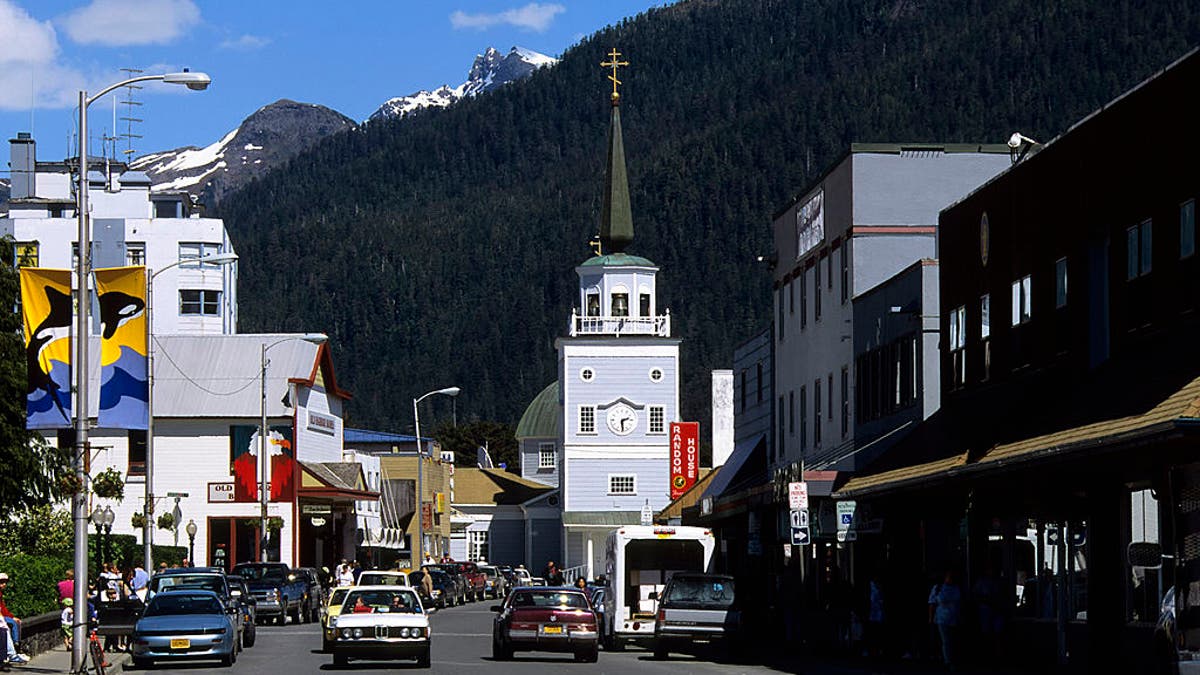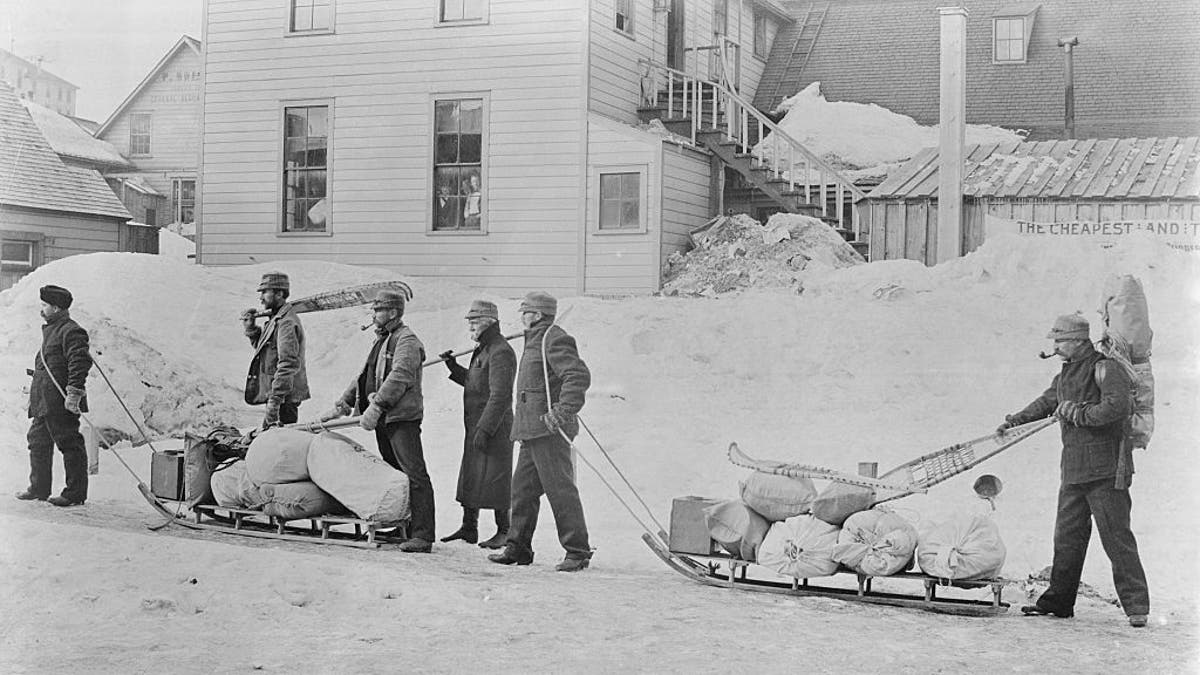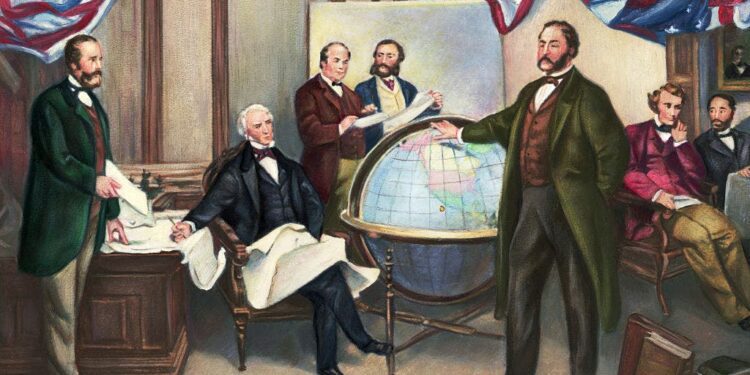The United States made the deal of the centuries тАФ securing the vast Alaska territory from Russia for $7.2 million тАФ on this day in history, Oct. 18, 1867.┬а
The transfer of 665,000 square miles of land between future rivals for global hegemony had a profound impact on the geopolitical balance of power still felt today.┬а
“The purchase of Alaska in 1867 marked the end of Russian efforts to expand trade and settlements to the Pacific coast of North America, and became an important step in the United States rise as a great power in the Asia-Pacific region,” writes the Office of the Historian of the United States Department of State.┬а
ON THIS DAY IN HISTORY, OCTOBER 17, 1835, TEXAS RANGERS FORMALLY PROPOSED AMONG SETTLERS PATROLLING FRONTIER
After months of international negotiations and political wrangling in Washington, D.C., the deal was ceremoniously cemented with the lowering of the Russian flag on Castle Hill in Sitka and the raising of the American flag.┬а
October 18 is celebrated each year in the Last Frontier as Alaska Day, an official state holiday.
Those shown at the signing of the Alaska Treaty of Cessation are (left to right) Robert S. Chew (chief clerk), William H. Seward (Secretary of State), William Hunter (2nd Assistant Secretary of State), Mr. Bodisco, Russian Ambassador Baron Edward de Stoeckl, Charles Sumner (senator), and Fredrick W. Seward (Assistant Secretary of State). (Getty Images)
The land steal works out to a meager 1.7 cents per acre for a territory more than twice the size of Texas and more than three times the size of California.┬а
Secretary of State William Seward and Russian minister Edouard de Stoeckl negotiated the agreement.┬а
The treaty created a geographic curiosity. The United States and Russia today are next-door neighbors. The two nations are separated by just 2.4 miles of ocean in the Bering Strait between the islands of Big Diomede (part of Russia) and Little Diomede (part of Alaska).┬а
Russian nationalists today are said to lament even now the loss of such a vast treasure of natural resources.
RUSSIA FIRED MORE THAN 80 CRUISE MISSILES INTO UKRAINE IN тАШRETAILATIONтАЩ FOR KERCH BRIDGE EXPLOSION: OFFICIALS
“If Russia was in possession of Alaska today, the geopolitical situation in the world would have been different,” Sergey Aksyonov, the prime minister of Crimea, reportedly said in a local TV interview in 2017, on the 150th anniversary of the deal.┬а
“October 18 is celebrated each year in the Last Frontier as Alaska Day, an official state holiday.”
Russian official and Vladimir Putin ally Vyacheslav Volodin said last summer that his nation might try to reclaim Alaska in response to U.S. and NATO sanctions over the war in Ukraine, according to numerous media reports.

A street scene on Baranof Island, Sitka, Alaska, with St. Michael’s Cathedral. The Alaska territory was officially transferred from Russia to the United States with a flag ceremony in Sitka on Oct. 18, 1867.┬а (Wolfgang Kaehler/LightRocket via Getty Images)
But hindsight is 20-20.┬а
Alaska at the time was seen by both nations as a wasteland.┬а
Czar Alexander II was reportedly willing to give the land away. American political and media pundits savaged Seward and then President Andrew Johnson administration for wasting millions in taxpayer dollars on what they believed was empty, frozen wasteland.┬а
SURFING STUNNER: WOMAN WAKESURFS ON LAKE IN HIGH HEELS, SIPS COFFEE, READS WHILE тАШON BOARDтАЩ
“Critics attacked Seward for the secrecy surrounding the deal, which came to be known as тАШSewardтАЩs folly,” according to the Library of Congress.┬а
“The press mocked his willingness to spend so much on тАЩSewardтАЩs icebox’ and Andrew Johnson’s тАШpolar bear garden.тАЩ”┬а
The land steal works out to a meager 1.7 cents per acre.
The New York Tribune and its powerful publisher Horace Greeley were among the deal’s most outspoken opponents.

Alaska Gold Rush. Starting for the Yukon from Juneau, Alaska. Photograph by Winter and Pond, 1896. (Getty Images)
“The territory which [Russia] owned in America was not only valueless тАж but was an expense and trouble the czar would gladly be rid of,” the Tribune reported earlier in 1867 when news began to surface of the pending deal, citing Russian royalty in St. Petersburg as the source.┬а
“The press mocked [the] willingness to spend so much on тАЩSewardтАЩs icebox’ and Andrew Johnson’s тАШpolar bear garden.тАЩ”┬а
“Russia would be willing to cede the territory to the United States as a gift if it were desirable to the Republic. This is certain. It is equally certain that Secretary Seward knew of the fact.”┬а
For more Lifestyle articles, visit www.foxnews.com/lifestyle.
Public opinion only began to turn in 1880 and the years that followed, with the discovery of vast troves of gold in Alaska.┬а
Americans began to flood the territory during the Alaska Gold Rush, setting it on the path to statehood.┬а
CLICK HERE TO SIGN UP FOR OUR LIFESTYLE NEWSLETTER
Alaska joined the union as the 50th state on Jan. 3, 1959, while Oct. 18 remains a celebrated date in state history.┬а
“With a parade and roster of events longer than the Fourth of July, Alaska Day is SitkaтАЩs signature celebration, renowned throughout the state,” reports state travel site Alaska.org.┬а
CLICK HERE TO GET THE FOX NEWS APP
“The festival week wraps up on October 18, when thereтАЩs a reenactment of the changing of the flag on Castle Hill, once home to the territorial governor and chief manager of the Russian-American Company.”
Source link : http://www.bing.com/news/apiclick.aspx?ref=FexRss&aid=&tid=67171142ebc94234972d1dc1fb1d76c7&url=https%3A%2F%2Fwww.foxnews.com%2Flifestyle%2Fthis-day-history-oct-18-1867-united-states-purchases-alaska-russia-million&c=6906161896753381248&mkt=en-us
Author :
Publish date : 2024-10-17 17:02:00
Copyright for syndicated content belongs to the linked Source.












